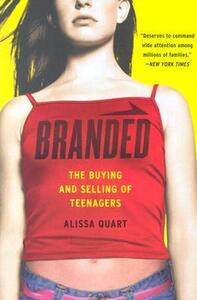Take a photo of a barcode or cover
teenagers are stupid and they get what they deserve!
This book did not change my life. It’s about the ways in which marketers brand teenagers, and the ways in which teenagers brand themselves. I recently read The Real Toy Story: Inside the Ruthless Battle for America's Youngest Consumers by Eric Clark, and it was sort of similar, although about a different age group. Both books make the point that manufacturers of toys, clothing, and other products aimed at younger people only care about making money – they don’t care about helping kids maintain their youth or figure out who they are. They also both point out that marketers see parents spending more money on their kids to make up for not being home as much, and that the youth market is expanding as more young people make their own decisions about what to buy. Also, selling things to younger people has the advantage of creating lifetime customers.
There was a section on the ways teenagers self-brand, which I thought was pretty interesting. The chapters discuss teenagers who get plastic surgery (the preference is to get it during the summer before college, so that classmates don’t know), pro-anorexia teenagers, teenage body builders and their supplements. Alyssa Quart also discusses teenagers who are stressing out to get into brand-name (Ivy League) colleges and teenagers who are becoming rich-and-famous by publishing their memoirs (spilling their secrets to the world before they’ve gotten any distance from them). She discusses marketing in schools, from Channel One to soda machine contracts to full-on corporately-owned schools.
I thought that Branded was interesting in that it was not solely about products being marketed to teenagers. A lot of the book was about images of teen-ness that young people (and parents) buy into – the “perfect” body, the “perfect” college. It was written in the early 2000s, so it felt a little outdated to me. It also had a few weird sentences that I had to read a few times and that seemed to be missing something. For example: “Edison’s CEO, Chris Whittle, founder of Channel One, the advertising-laden high school television station that broadcasts to 12,000 classrooms a day, and the activists mock Whittle’s stuffy bow tie and rail against the specter of Wall Street investors profiting from their education.” Isn’t this missing a verb or something? Like it should say “Chris Whittle IS the founder of Channel One and the activists mock him”? This is not the only example of this problem.
There was a section on the ways teenagers self-brand, which I thought was pretty interesting. The chapters discuss teenagers who get plastic surgery (the preference is to get it during the summer before college, so that classmates don’t know), pro-anorexia teenagers, teenage body builders and their supplements. Alyssa Quart also discusses teenagers who are stressing out to get into brand-name (Ivy League) colleges and teenagers who are becoming rich-and-famous by publishing their memoirs (spilling their secrets to the world before they’ve gotten any distance from them). She discusses marketing in schools, from Channel One to soda machine contracts to full-on corporately-owned schools.
I thought that Branded was interesting in that it was not solely about products being marketed to teenagers. A lot of the book was about images of teen-ness that young people (and parents) buy into – the “perfect” body, the “perfect” college. It was written in the early 2000s, so it felt a little outdated to me. It also had a few weird sentences that I had to read a few times and that seemed to be missing something. For example: “Edison’s CEO, Chris Whittle, founder of Channel One, the advertising-laden high school television station that broadcasts to 12,000 classrooms a day, and the activists mock Whittle’s stuffy bow tie and rail against the specter of Wall Street investors profiting from their education.” Isn’t this missing a verb or something? Like it should say “Chris Whittle IS the founder of Channel One and the activists mock him”? This is not the only example of this problem.
I hated this book so much. It was really silly and there were several points where the author is such a freaking hypocrite. UGH!!! I hate it! And the cover? Really? This honestly looks like a book about teenage human trafficking. Nope. It's about brands.
Anti-consumerist propaganda. The book was informational, and seemed thought out, but it was clear that the author, for all of her "research" did not get to the heart of what American teens are really all about. She seemed to talk mainly to white, affluent, female teens which colored her argument. She also seemed to lack basic knowledge about teenaged experiences that differed from her own, which detracted from the narrative severely, at least for me.



